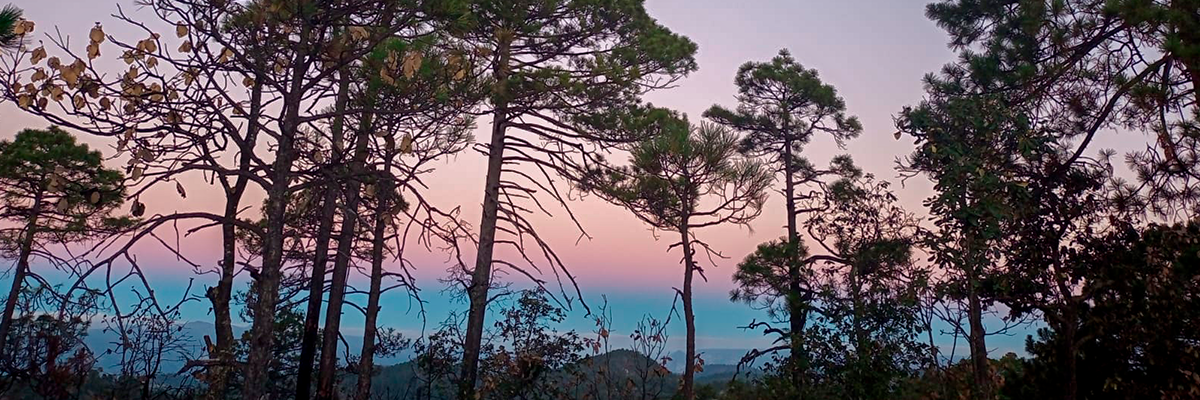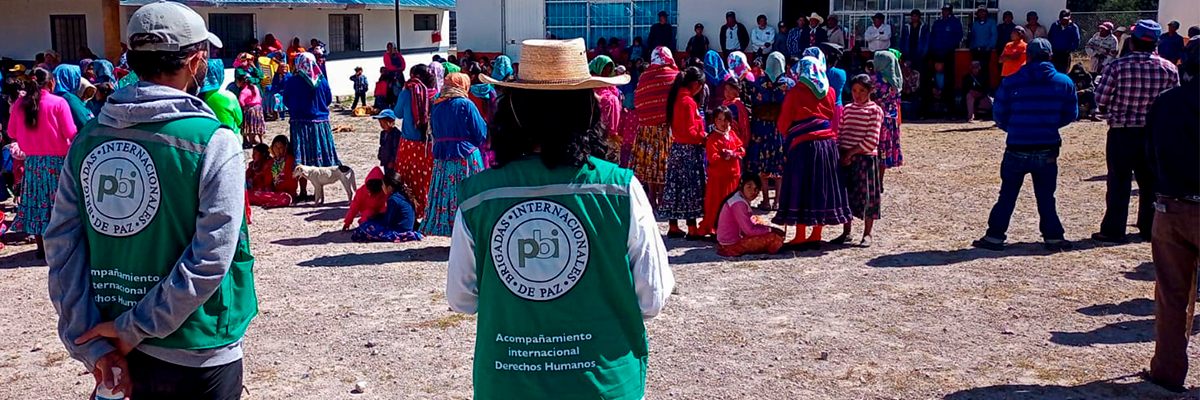Article by PBI-Mexico
Deep in the mountains of Western Sierra Madre, in the North East of Mexico, is the rarámuri community of Choréachi, located in the municipality of Guadalupe y Calvo, over 16 hours away from Chihuahua. Choréachi is located between the states of Sinaloa, Durango and Chihuahua, in a rocky and mountainous area with dangerous and difficult-to-access dirt roads.
In October 2021, PBI received a petition by Alianza Sierra Madre (ASMAC) to accompany them on their trip to Sierra Tarahumara. In the presence of CEDEHM, together with armed security and federal and state public officials, we observed the working committees that took place with rarámuri communities. Both men, women, boys and girls, as well as indigenous authorities, had the opportunity to express their reality and the needs of their context in order to update the diagnostic on social and security matters, within the framework of the preventive measures requested by the Inter-American Court of Human Rights in 2017 to the Mexican state.
During our stay, we experienced the goodness and tranquility this far-off region offers, We were able to take in the great richness and immensity of the forests. A value which, according to ASMAC and Choréachi members, has awaken the greed of the chabochis – a name given to mongrels –. In the territories of this community, they say that a single pine which has been protected for decades by rarámuri inhabitants, is seen only as a large sum of money for lumberjack corporations.

For the rarámuri, the land, trees and mountains are sacred and are an intrinsic part of their way of life. They think of these elements as a single unit, humanity/nature. The respect they show to their environment, the forest, the animals and its resources are an essential part of living in harmony. They respect and appreciate a tree as much as a human being. Nevertheless, this rarámuri vision is confronted by the reality of a context which they have identified in their territory: The overexploitation of the forest.
It became evident in our journey that the exacerbated demand for lumber has activated the economy of the region, which has increased the foreign and mongrel population, while for the indigenous communities the felling of forests implies the destruction of their lives, a direct violation to their culture and their view of the world. They see how, to the chabochi, the forest simply represents economic capital. Slowly and over time, this reality has meant the loss of territory for the rarámuri, and the facing of difficulties to perpetuate their traditions and social fabric.
The stories we heard during the working committees spoke of the fear of a community to continue losing everything, of not finding institutions to call upon because the judicial and administrative, federal and local authorities whom they have reached out to have “turned their backs on us”, and favor private and economic interests in the region. This way, ASMAC points out that, because they have no acknowledgment to the ownership of their ancestral lands, nor the control overuse of resources, communities find themselves between a rock and a hard place, vulnerable and victims of theft, threats, intimidation, expropriation and displacement. Boys and girls expressed in their drawings the pain they feel at the loss of their parents. Some women timidly shared their fears upon the arrival of “the bad men” and their fear for protecting their children while their colleagues are forced to move away from their families to find work.
“We don’t live in peace in our own lands because we are afraid. It is beautiful to live together, and we come to agreements for the different activities we partake in in our village, but this tranquility has been taken from us by the chabochi people, who have introduced themselves to our places, our lands and our forests, and forbid us from leaving our village to lodge complaints or request any support.
We live with this fear because the chabochi people have arrived in our villages and, this way, they introduce themselves into our territory, even though we’ve been fighting for 20 years for the respect to and acknowledgement of our territories and our authorities. We are afraid to walk along the trails because the chabochi people walk them up and down, and we are afraid to run into them, to have our families be the victims of their harassment and threats. We have been dispossessed of our lands and we do not live in peace like before”. Indigenous Community of Choréachi, IACoHR Hearing (2021).
The overexploitation of forests has generated repercussions and has increased violence against the indigenous community of Choréachi, a situation which was acknowledged by the Inter American Commission of Human Rights (IACHR) and the Inter American Court of Human Rights (IACourtHR), which, in 2014 and 2017 respectively, granted preemptive and provisional measures to the community and the personnel at ASMAC (the organization accompanying the community in their legal battle for the recognition of their territory). These measures include a requirement to the Mexican state to adopt a course of action that guarantees the life, integrity and security of the rights defenders of Choréachi.
These occurrences are not isolated incidents, they are part of a generalized context in Mexico, where raising one’s voice for the defense of the territory comes with a level of exposure that puts the life and integrity of indigenous communities at risk. Just in 2020, Global Witness reported at least 30 registered lethal attacks against land and environmental rights defenders in Mexico, half of which were against indigenous communities. Furthermore, Guadalupe y Calvo is currently within the five most violent municipalities in the country, and in the last three years, at least 17 land rights defenders from the sacred Rarámuri territory were murdered.
The situation of insecurity and injustice is worrying and it adds up to the invisibilization in which the Choréachi community finds itself, a community which still today has no legal recognition by the State about their rights to their ancestral territory and natural resources, facing a context of violence, aggression and threats.
PBI will continue to make their struggle visible and to express our worry to the national and international support networks available regarding the situation of risk for the community and for the rights defenders from accompanying organizations like ASMAC. Accompanying rights defenders and indigenous communities who consider remaining in Sierra Tarahumara means caring for life.

